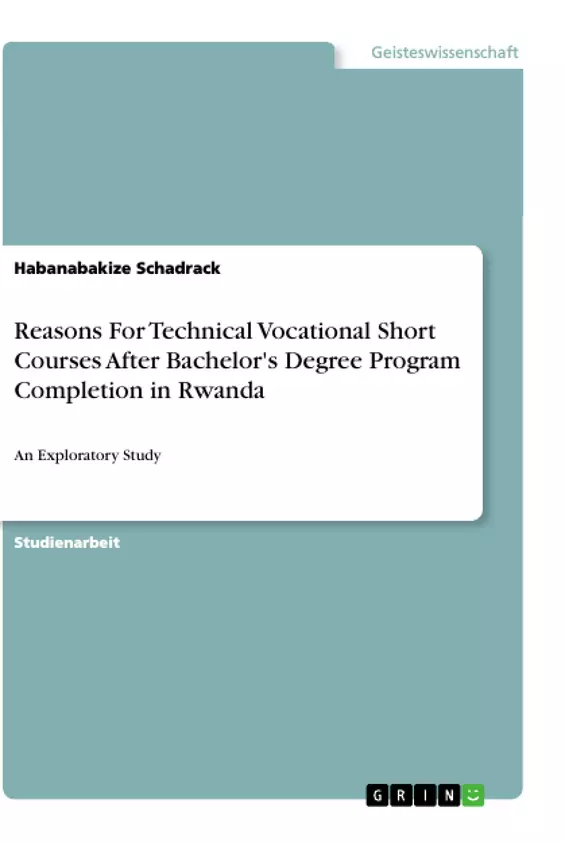The general objective of this study is to explore the factors leading university bachelor's degree holders to undertake technical vocational short courses. The specific objectives of this study are to explore the factors that lead university bachelor's degree graduates to undertake technical vocational short courses, to describe the existing relationship between university bachelor's degree programs and technical vocational programs and to suggest changes needed in university curriculum.
Exploring the factors that lead a university graduate to undertake training such as Automobile repair, Air conditioning and refrigeration tools repair, Multimedia, Filmmaking, Carpentry, Plumber, and other Machine tools reparation is the concern of this research. This study aims to explore factors behind undertaking Technical Vocational Short Courses after bachelor's degree academic program completion. The sample size was 72 trainees, but 58 only were willing to participate. Considering that people completing bachelor's degree and undertake technical vocational short courses are many, the researcher chose a sample size in order to generalize the results based on only 58 respondents to all bachelor degree holders in technical vocational courses or activities. In order to collect data from those respondents, we used sampling techniques.
Inhaltsverzeichnis
- ABSTRACT
- DEDICATION
- TABLE OF CONTENTS
- LIST OF TABLES.
- LIST OF FIGURE
- LIST OF ABREVIATIONS & ACCRONYMS...
- LIST OF APPENDICES
- ACKNOWLEDGEMENT..
- CHAPTER ONE....
- INTRODUCTION.
- Background to Study..
- Statement of the Problem ......
- Objectives...........
- Research Questions
- Hypothesis......
- Significance of the Study.
- Justification of the Study.
- Limitations
- Delimitation of the Study.
- Operational Definition of Term
- CHAPTER TWO.......
- REVIEW OF LITERATURE.
- Conceptual Review.
- Demographic Factors
- Unemployment ......
- Bachelor Degree Program Completed......
- Realizing Inner Dreams.
- Seeking Additional Skills.
- Undertaking Technical Vocational Short Courses.
- Theoretical Review.
- Diffusion of Innovation Theory.
- The Theory of Probable Destiny
- The Theory of Social Control............
- Behaviorism Theory......
- Empirical Review
- Gap in Literature.
- CHAPTER THREE.
- METHODOLOGY..
- Research Design.....
- Mixing Quantitative and Qualitative……………………………
- Population and Sampling Techniques
- The Target Population .......
- Sampling Technique.…….......
- Research Instrument...
- Data Gathering Procedures...
- Qualitative Data……………………………………
- Quantitative Data.
- Statistical Treatment of Data
- Mean............
- Standard Deviation (σ).
- Correlation.....……………
- The Ethical Considerations
- CHAPTER FOUR
- PRESENTATION OF FINDINGS, ANALYSIS AND INTERPRETATION.
- Identification of Respondents.
- Gender........
- Marital Status
- Age......
- Level of Education.......
- Socio-economic Status...
- Residence.....
- Training Option...............
- Prior Academic Program......
- Period Spent Unemployed.
- Demography.
- Unemployment........
- Bachelor Degree Academic Program Completed.
- Realizing Inner Dreams
- Seeking Additional Skills.
- Undertaking Technical Vocational Short Courses.
Zielsetzung und Themenschwerpunkte
Diese explorative Studie befasst sich mit den Faktoren, die dazu führen, dass Personen nach Abschluss eines Bachelor-Studiums technische und berufliche Kurzlehrgänge absolvieren. Die Studie analysiert die Erfahrungen von Absolventen, die an NEP-geförderten Kursen am IPRC Kicukiro in Ruanda im Jahr 2019 teilgenommen haben. Ziel ist es, die wichtigsten Einflussfaktoren zu identifizieren und Empfehlungen für die Verbesserung der Situation zu geben.
- Motivationen für den Besuch von technischen und beruflichen Kurzlehrgängen nach dem Bachelor-Abschluss
- Analyse der Rolle von Arbeitslosigkeit und akademischen Studien
- Untersuchung der Bedeutung von zusätzlichen Fähigkeiten und der Verwirklichung persönlicher Träume
- Auswirkungen des Geschlechts und der sozioökonomischen Faktoren auf die Entscheidung für eine technische Ausbildung
- Bewertung der Relevanz von technischen und beruflichen Kurzlehrgängen für den Arbeitsmarkt
Zusammenfassung der Kapitel
Kapitel 1 führt in die Thematik ein und beschreibt den Forschungsrahmen. Es werden die Forschungsfrage, die Hypothesen und die Bedeutung der Studie erläutert. Kapitel 2 bietet einen Überblick über die relevante Literatur, einschließlich konzeptioneller und theoretischer Ansätze. Es werden verschiedene Faktoren untersucht, die die Entscheidung für technische und berufliche Kurzlehrgänge beeinflussen können, wie z. B. Arbeitslosigkeit, akademische Studien und die Verwirklichung persönlicher Träume. Kapitel 3 erläutert die Methodik der Studie, einschließlich der Forschungsstrategie, der Stichprobenziehung und der Datenerhebungsmethoden. Kapitel 4 präsentiert die Ergebnisse der Studie und analysiert die Daten, um die wichtigsten Einflussfaktoren auf die Entscheidung für technische und berufliche Kurzlehrgänge zu identifizieren.
Schlüsselwörter
Technische und berufliche Kurzlehrgänge, Bachelor-Abschluss, Arbeitslosigkeit, akademische Studien, zusätzliche Fähigkeiten, persönliche Träume, Geschlechterunterschiede, sozioökonomische Faktoren, IPRC Kicukiro, Ruanda, NEP-Förderung.
Häufig gestellte Fragen
Warum absolvieren Bachelor-Absolventen in Ruanda technische Kurzlehrgänge?
Häufige Gründe sind Arbeitslosigkeit, der Wunsch nach praktischen Fähigkeiten für den Arbeitsmarkt oder die Verwirklichung persönlicher Träume in Bereichen wie Automobilreparatur oder Multimedia.
Welche Rolle spielt die Arbeitslosigkeit bei dieser Entscheidung?
Viele Absolventen finden nach ihrem Studium keine Anstellung und nutzen technische Lehrgänge, um ihre Beschäftigungsfähigkeit durch handwerkliche Kompetenzen zu erhöhen.
Was ist das IPRC Kicukiro?
Es ist eine Bildungseinrichtung in Ruanda, an der technische und berufliche Trainings (TVET) angeboten werden, die oft durch nationale Programme wie NEP gefördert werden.
Welche theoretischen Ansätze erklären dieses Phänomen?
Die Studie zieht Theorien wie die "Diffusion of Innovation", die "Theory of Probable Destiny" und den Behaviorismus heran.
Sollte das Universitäts-Curriculum geändert werden?
Die Studie schlägt vor, akademische Programme stärker mit praktischen, technischen Elementen zu verknüpfen, um die Lücke zum Arbeitsmarkt zu schließen.
- Quote paper
- Habanabakize Schadrack (Author), 2019, Reasons For Technical Vocational Short Courses After Bachelor's Degree Program Completion in Rwanda, Munich, GRIN Verlag, https://www.grin.com/document/541342



